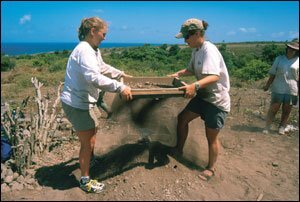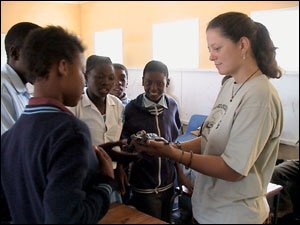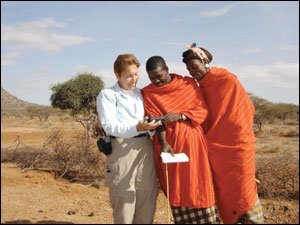Science educator Miriam Sutton spent last summer researching the sea floor off Canada’s Labrador coast, attending a workshop at a marine field station in New Jersey, and studying oceanography at the U.S. Naval Academy. The best part: The 8th grade teacher from North Carolina received stipends for her journeys, and almost all of her expenses were covered.
Sound too good to be true? Opportunities for teachers to spend summers pursuing their passions are not as rare as one might think, according to Jill Frankfort, a former teacher who cataloged such programs in her new book, 100 Paid Adventures for Teachers. “If teachers are looking for a really extraordinary paid adventure, there’s a spot for them,” Frankfort says.

The fellowships, workshops, travel tours, and other opportunities she outlines are designed to give teachers exciting experiences so they can bring new knowledge and enthusiasm back to their schools. Sutton, for example, applies what she learned to her class activities and inservice workshops, and she encourages her students to explore the world.
Some of the programs can also be substituted for traditional professional development courses. And, Frankfort adds, summer fellowships facilitate networking and brainstorming with like-minded teachers.
The former high school math teacher from Providence, Rhode Island, got the idea for her book as she researched possible getaways for the summer of 2004. She became frustrated by all the fliers advertising expensive professional development “adventures” she couldn’t afford. But as she began digging around, she was surprised by the number of paid opportunities out there. Rather than heading to a far-flung destination, Frankfort decided to spend the summer compiling her findings into a book. She first published it locally in 2005; when it sold out, she had the book distributed nationwide.

For the more adventurous educator, Frankfort recommends the Earthwatch Institute’s Education Fellowship Program, which each year sends 200 teachers from 25 states on one- to three-week journeys to study specific conservation efforts. Upcoming expeditions will reach almost every corner of the globe, from the Amazon to remote Russian villages.
She also has good things to say about the Armada project, which gives teachers the opportunity to participate in oceanic, polar, and environmental research. The program, funded by the National Science Foundation, led Sutton’s voyage on the Labrador Sea.
One of the largest fellowship programs is run by the National Endowment for the Humanities, which pays teachers $1,800 to $4,200 to attend seminars taught by scholars across the United States and occasionally in other countries. This summer, some teachers will travel to Siena, Italy, to study Dante’s Commedia, and others will attend an institute on teaching jazz as American culture at Washington University in St. Louis, Missouri.

Admission requirements vary, but longer programs and those that take teachers to sought-after destinations—especially Europe—can be quite competitive. Frankfort suggests gathering recommendations and drafting essays well before the application deadlines, which generally fall between December and March. Many organizations, she adds, may accept “slightly late” applications.
The strongest applications demonstrate an interest in venturing out and extending learning beyond classroom walls, says Sutton. She recommends starting with shorter journeys to gain experience before applying to longer (and more competitive) programs. She believes her participation in the one-week National Oceanic and Atmo-spheric Administration Teacher at Sea program in summer 2005 helped her win the monthlong Armada fellowship last year.
Sutton also advises teachers to outline their plans for incorporating what they learn into the classroom, and to not shy away from applying more than once. Some educators aren’t accepted until the second time around. Sutton herself has been rejected, but thinks the experience helped her learn about the application process.
More information can be found in Frankfort’s book, which details eligibility and application requirements, financial details, and professional development and graduate credit possibilities.




